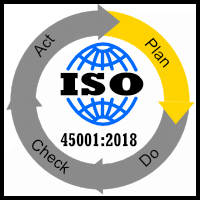|
|
ISO 45001:2018 4.1 ContentSend comments on this topic |
FREE QHSE Software Click <HERE> to Learn More |
||
QHSE Support >(Site Map) Health & Safety Guidance > ISO 45001:2018 Clauses > ISO 45001:2018 clause 4 >
ISO 45001:2018 Clause 4.1 Understanding the organization and its context
|
PLAN |
DO |
CHECK |
ACT |
Clause 4.1 Breakdown
4.1 Understanding the organization and its context
Context of the organization
Understanding the context of the organization is paramount for effective OH&S management. This involves identifying both internal and external factors that can influence the organization's OH&S outcomes. The specifics of this understanding will vary depending on the size, complexity, and nature of the organization.
In simpler terms, organizations must demonstrate an awareness of their internal and external OH&S issues and how these are addressed within the OH&S management system.
Simplistic view. "Demonstrate an understanding of the organization's internal and external OH&S issues, and characterize how within the OH&S management system they are managed."
Typical external issues may include, but are not limited to:
•contractors
•suppliers
•relevant legislation (e.g. Acts, Regulations, Statutory Instruments)
•enforcement bodies
•industry specific requirements
•emergency services
•trade associations
•general public
•culture, social and political influence
•optional requirements (e.g. ISO 9001, ISO 14001, IOSH membership)
Typical internal issues my include, but not limited to:
•Economics and Financial factors
•Organizational governance and structure
•business activities (e.g. chemical, biological agents, explosive, moving machinery)
•workforce characteristics (e.g. training, skills, experience, competency, age, attitudes and cultural beliefs)
•employment practices (e.g. workloads, working hours and shift patterns, working conditions, ergonomic considerations)
It is unlikely that clause 4.1 context of the organization statement details will be in a nice neat place. Instead, it may need to be gleaned from various sources such as:
•management and management review meeting minutes:
•OH&S policy,
•OH&S objectives,
•vision and mission statements,
•project plans,
•performance reviews,
•operational controls,
•work procedures,
•work instructions,
•emergency response procedures,
•monitoring, measurement, and performance figures,
•OH&S objectives,
•accident statistics,
•accident investigations,
•absenteeism records,
•training records, etc.
While the standard does not mandate a formal process for documenting this information, having such documentation can prove beneficial for accreditation bodies, internal and external audits, and enforcement agencies.
Understanding the organization's context lays the foundation for developing and implementing an effective OH&S management system that aligns with the organization's goals and objectives.
Useful integrated management system cross references
ISO 9001-2015 4.1 - Understanding the organization and its context
ISO 14001-2015 4.1 - Understanding the organization and its context
Help file v2.276.407 : QHSE Support - Website On Safe Lines
onsafelines.com QHSE Software 2025 : Webmaster: Brian G. Welch MSc(QHSE), NVQ4(OH&S), CMIOSH



